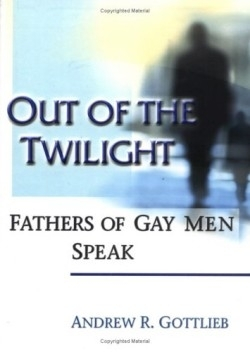Out of the Twilight
Fathers of Gay Men Speak
Harrington Park Press
The “Coming Out” story has been the subject matter of many works in the field of gay and lesbian studies. Gottlieb provides a fresh viewpoint to this topic by examining an often ignored voice in this process. “Much of what has been written on the father-gay son dyad has been from the perspective of the gay son.” The emphasis of the author’s research was to give a full account of the father’s experience.
Gottlieb sets up his study by examining what happens to a father as he crosses through the normal stages of development with his son, as well as reactions when faced with atypical circumstances to him and to his family-for example, the crisis of homosexuality. Because the experience of fathers of gay men “has been a topic very much in the closet,” Gottlieb chose a research modality sensitive to this area of inquiry-a qualitative method to help these stories and these storytellers come alive.
Twelve fathers were interviewed providing fully emerged themes and hypotheses. A major strength to the study was the attention to selecting men who mirrored a range of characteristics in terms of race, nationality, religion and age. Prior to starting his interviews, Gottlieb felt that “the experience of talking about their sons would elicit profound feelings of disappointment and sadness for the fathers.” What he found was a tendency for them to emphasize the positive aspects of their relationships and to minimize the negative.
Limitations to the study are acknowledged in that there are fathers unwilling to discuss what they think about their sons. There are those that find that their gay sons are mentally ill, going against religious doctrine, etc. The results only represent fathers with certain experiences, “all of whom at least acknowledge their sons’ homosexuality, most of whom are working toward full acceptance.”
The stories shared by the fathers in Out of the Twilight are powerful, emotional and affirming to the strength of the family unit. These narratives will benefit families finding themselves in similar situations-that of understanding a gay child, sibling or relative. The work is also an exploration of how adults cope in the world, dealing with events beyond their control. (March)
Paul J. Willis
Reviewed by
Paul J. Willis
Disclosure: This article is not an endorsement, but a review. The publisher of this book provided free copies of the book to have their book reviewed by a professional reviewer. No fee was paid by the publisher for this review. Foreword Reviews only recommends books that we love. Foreword Magazine, Inc. is disclosing this in accordance with the Federal Trade Commission’s 16 CFR, Part 255.

